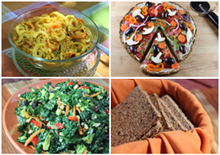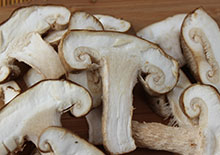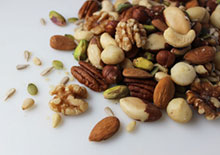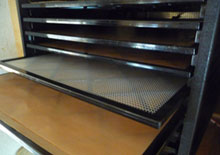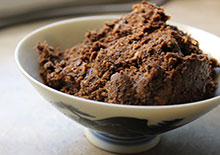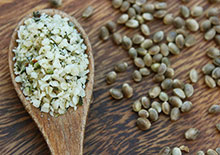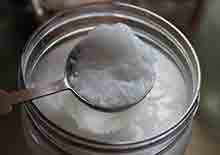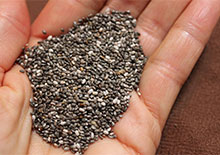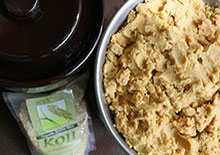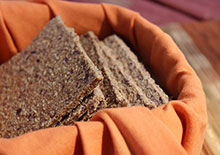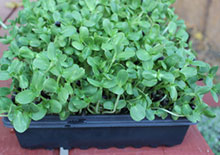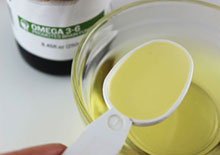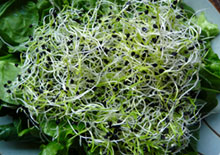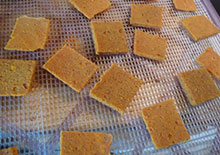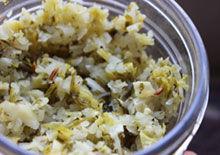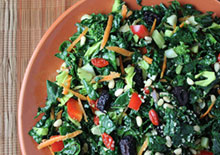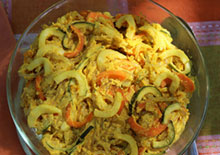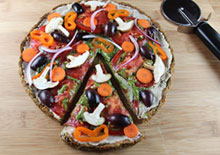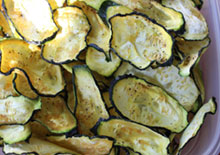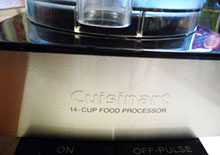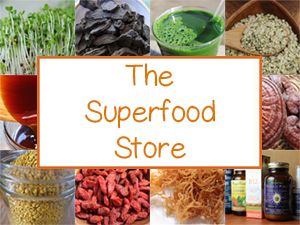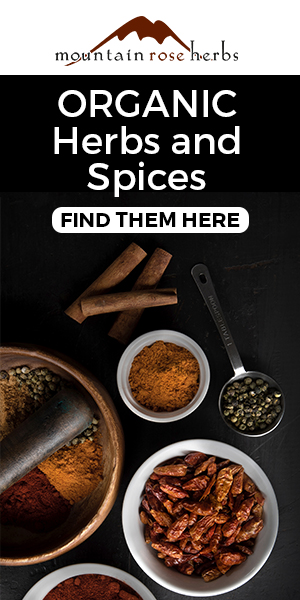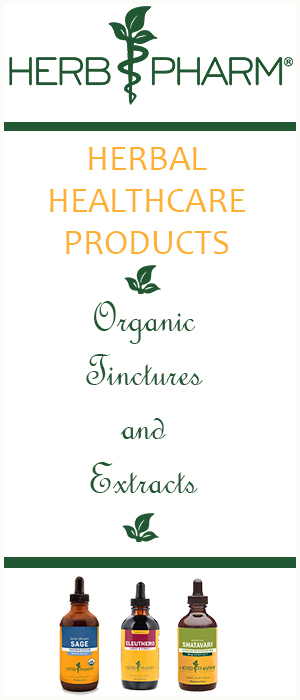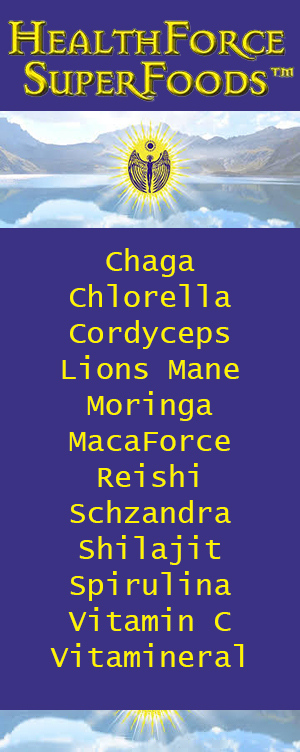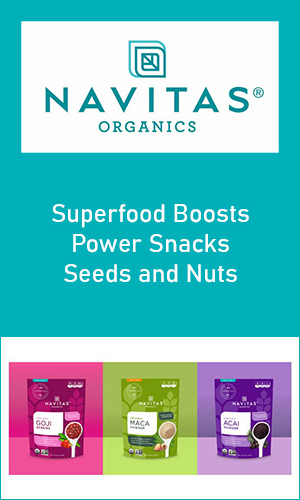A Raw Vegan Burger Recipe Using Nuts, Seeds and Shiitake
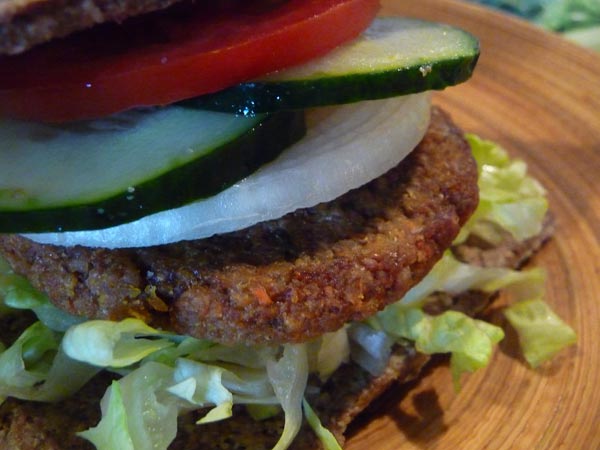
It's about time we share our raw vegan burger recipe for those days when you want the taste sensation of a "burger" with all the fixings’. This one uses nuts and seeds instead of cow, turkey or salmon and it doesn't get fried on a grill, but is prepared in a dehydrator.
This recipe includes certain ingredients that mock the texture and flavorings of a rich juicy burger patty and is definitely reminiscent of those "once upon a time" fried food days of the past.
Or, maybe some of you still eat meat based burgers on occasion. Once in a while is not going to most likely hurt you. It's not what you eat some of the time, but what you eat on a regular basis that matters health wise.
Since you've arrived on our vegan burger recipe page, you probably are already aware that over eating the average hamburger has been linked with too many negative health repercussions to make it apart of your everyday meal plan.
That's when recipes like this one can help you out a lot. They can also be frozen and re-dehydrated for a last minute healthy burger binge.
We think you'll enjoy these vegan nut burgers even more than the
non-vegan versions because they have a meaty taste but without the rise
in blood pressure or the artery clogging side effects. Plus, they are
lower in calories and higher in fiber content.
These are heart healthy burgers with just the right mix of superfoods to take things up a notch nutrition wise. They make a great replacement for packaged vegetarian store bought options, usually made with soy or grains, and are a whole lot tastier in our opinion.
Why is this Vegan Burger Recipe Better?
The answer to that question is found in the list of ingredients used and in the way it is prepared. We use walnuts, shiitake mushroom, hemp seed and coconut oil to give it the richness in flavor and taste many people enjoy in a burger.
These burgers are not cooked using high heat temp's, but are dehydrated to ensure greater enzymes and nutrients are present.
We don't actually advise cooking or frying nuts or seeds as their oils are highly volatile and become toxic when exposed to high temperatures. If you want a homemade vegan burger recipe that you can cook, we would stick with bean, tempeh, mushroom or grain varieties, rather than nuts.
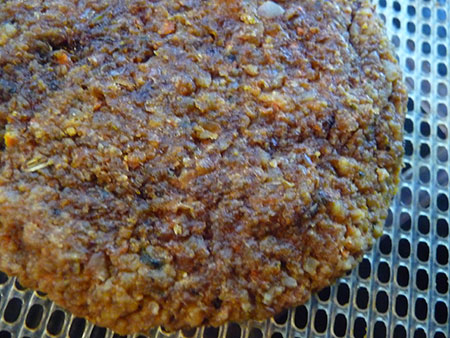
Using Coconut Oil
We like to use coconut oil in our recipe because it replicates the fatty texture and greasiness of a burger but without the harmful effects of refined oils or trans fats found in many commercial vegan burger products.
Coconut oil is a "good saturated fat" composed of medium chain fatty acids that easily converts to an energy burning fuel source. This type of raw plant fat does not contain cholesterol, unlike animal fats, but instead helps to normalize cholesterol levels as well as increase metabolism and thyroid function.
Omega-3 Fatty Acids in Chia, Hemp Seeds and Walnuts
Hemp seeds and chia are two seeds that are particularly high in omega-3 fatty acids. These are the essential fatty acids most people are lacking in an average diet.
EFA's are "essential" because they need to be consumed through the foods we eat. They are vital components to such things as neurological functioning, cell membrane stability, oxygen transfer, inflammatory regulation, immune response and cardiovascular maintenance.
When using nuts in entree's it is always best to try to also combined them with seeds high in omega-3 fatty acids.
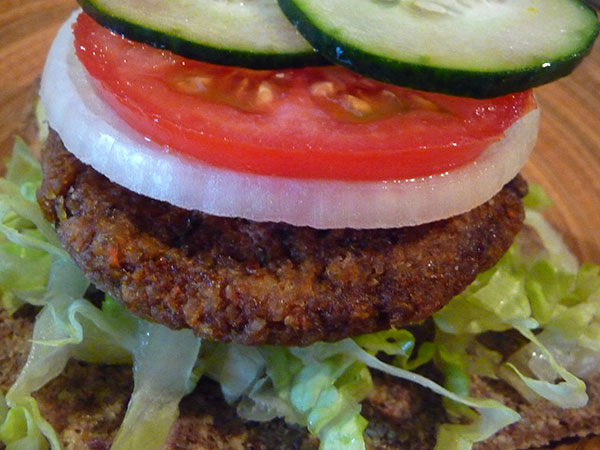
Walnuts and Shiitake are Our Favorites for Homemade Burgers
Nuts are a good choice as a main ingredient in a raw vegan burger recipe because they are heavier than seeds, but not as starchy as cooked grains or legumes used in some vegan burgers.
Raw nuts are typically higher in omega-6 fatty acids, but walnuts actually have a small amount of omega-3's compared to other varieties. Walnuts contain lecithin and choline helpful for nourishing the brain and its functions. (Source) And, like the 'doctrine of signatures' are uniquely shaped like the brain itself.
Buying Raw Nuts and Seeds
Recent U.S. regulations require some commercial nut and seed varieties (mostly almonds) to undergo steam pasteurization for "health and safety" reasons. There are some loop holes within these laws, however, and "raw" nuts and seeds are still available on a large scale by organic high quality growers.
This vegan burger recipe would not be complete without the meaty rich flavor that shiitake mushrooms provide. They are our personal favorites over other types of mushrooms, like portabella, crimini or white mushrooms, not only because of their "mushroomy deliciousness", but also because they have added effects as a medicinal mushroom.
Shiitake's naturally boost the immune system, have antiviral properties, polysaccharide-rich nutrients and also help to regulate blood pressure and lower cholesterol.
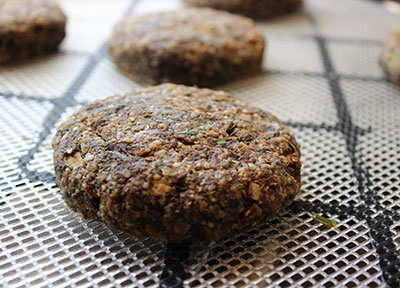
Miso and Flavorings
The only "not totally raw" ingredient in this recipe is the 1T of miso. We are big miso fans and love to make our own homemade gallon of miso once a year.
When creating recipes that you want to taste "cooked", but aren't, the fermented taste of miso does the trick. Garlic and onion powders are also helpful for mimicking a grilled smoky flavor.
Nut Burger Recipe
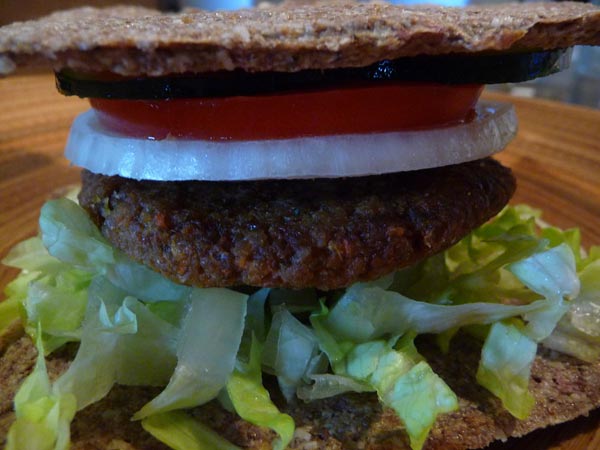
Ingredients:
- 2C walnuts
- 1/2C hemp seeds
- 2C sliced shiitake mushrooms (marinated in 1t shoyu and 1T olive oil)
- 1/4C ground chia seed
- 1 1/2T Italian spices
- 1t miso
- 1/8C coconut oil
- 1t garlic powder
- 1t onion powder
- 1/4t black pepper
- 1/4C finely diced celery
- 1/2C med carrot (finely grated)
- 1/2C chopped parsley
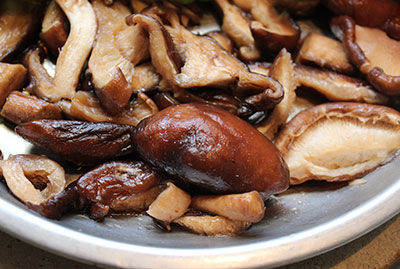
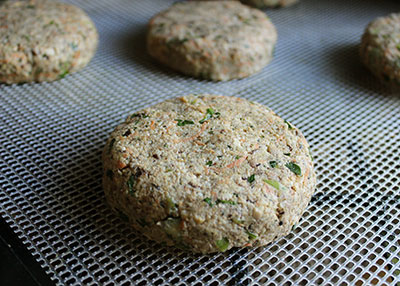
Directions:
- Marinate the shiitake mushrooms overnight on a flat plate.
- Soak the walnuts overnight and strain.
- In a food processor, process walnuts, hemp seeds, coconut oil, ground chia seed, miso, spices, garlic, parsley and onion powders.
- Process completely to a meal-like texture.
- Place this mix in a big bowl and set aside.
- Next, process the marinated shiitake to a hamburger-like consistency.
- Add this to the nut mixture bowl and stir together with the finely grated carrot and celery.
- Make 5-6 large burger patties and place on a dehydrator screen.
- Dehydrate at 118°F overnight or for 7-8 hours.
These burgers can be frozen for later use or stored in the refrigerator. You can warm them for an hour in the dehydrator before eating if you like.
Serving Options
We like this vegan burger recipe served on onion bread as our "bun", but you can also use lettuce leaves, collard or cabbage as well. Sometimes we make our own raw mayo, raw ketchup and raw mustard. We'll have more recipes for those at some point.
These burgers are also great with sprouts, sunflower greens and our favorite... sauerkraut!
For a cheese burger, you can use our cheez it recipe and make your own cheese slices to go on top.
